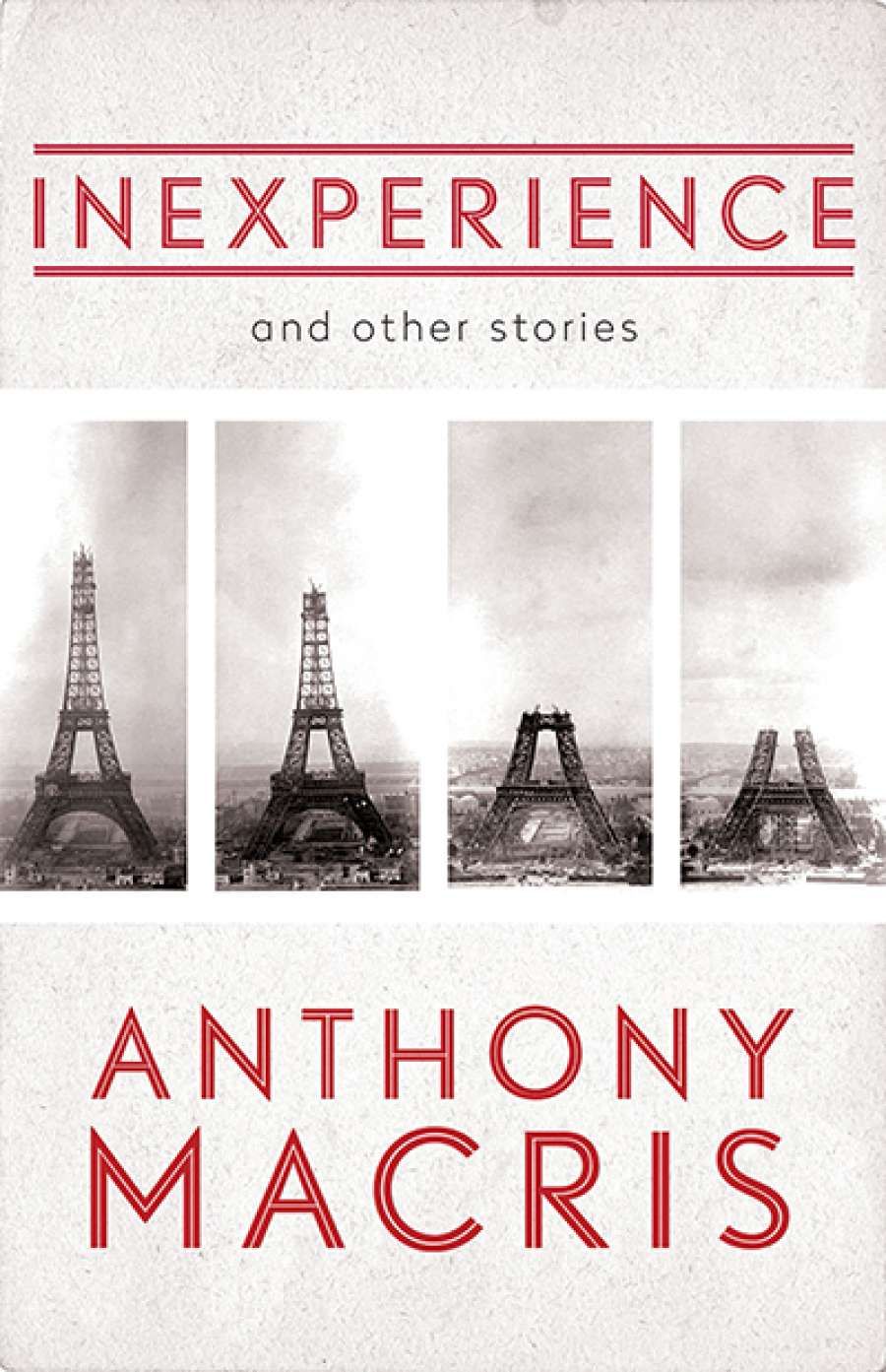
- Free Article: No
- Contents Category: Fiction
- Custom Article Title: Chris Flynn reviews 'Inexperience and other stories' by Anthony Macris
- Book 1 Title: Inexperience and other stories
- Book 1 Biblio: UWA Publishing $24.99 pb, 230 pp, 9781742588704
Although only 136 pages in length, ‘Inexperience’ is a moving portrait of Australian expectation and disappointment. The couple’s itinerary is somewhat aimless and exploratory, with a kind of restless ennui hanging about their necks, reminiscent of that felt by Kit and Port Moresby in Paul Bowles’s The Sheltering Sky (1949). Macris has some choice observations about modern Antipodean life: ‘It’s a double-edged privilege, being Australian. If that’s the only passport you hold, there’s no real escape from paradise.’
The couple are philosophically devastated by their exposure to the Old World; their fantasy of finding meaning in European sophistication is rudely dashed. By the end, the narrator is weighing up the advantages of an early return home. ‘And you didn’t have to work so hard to be middle class in Australia. Being middle class in Europe looked like a real chore, with bad weather to boot.’ Mirroring the reality of many open-ended European excursions, the trip comes to a sudden, downbeat halt, for character and reader alike. The first hundred pages of ‘Inexperience’ are excellent, and while it is fruitless and unfair to wish the author had continued in this vein for another two or three hundred, some might find it frustrating to witness such a prodigious talent as Macris curtailing a story after so much detailed set-up and character work.
The remaining sixty pages of Inexperience and Other Stories reprints three of Macris’s discrete short fictions. In ‘The Quiet Achiever’, a man visits a patient in a psychotherapeutic clinic. ‘Triumph of the Will’ sees a small shop owner fretting as he watches the construction of a shopping mall nearby. ‘He felt as powerless as a tribal warrior shaking a spear at a division of the US army.’ Both were originally published in 1988.
‘The Nest-Egg’ (1990) is the pick of the bunch – a funny polemic railing against the cost of modern living, still relevant today. The grumpy narrator delineates all the sacrifices one must make in order to survive financially. He decides to read two books a month for the next fifty years. Allowing for inflation, he estimates the cost of these 1,200 books will be $42,849.42, or about fourteen cents per page. This is assuming that he will read from eight to eleven pm each weeknight. ‘I’ll sit in my uncomfortable armchair, a vinyl monstrosity from Saint Vinnies, not waiting for anyone to call or drop by due to the fact that I won’t have a phone or any friends to visit me, because my nest-egg, jealous and demanding creature that it is, won’t allow me any.’
 Anthony MacrisThe forced austerities of ‘The Nest-Egg’ hark back to the main story, whose abrupt ending lingers. Throughout the book, Macris is urging us to embrace disappointment. Expectation of an ‘experience’ destroys the couple’s relationship, ruins repeated art viewings, and undermines the very idea of Europe. It is cleverly subversive of the author to likewise hoodwink the reader. Too often contemporary writing is forced into easy to digest chunks of narrative. Spoonfed 120-minute ‘event’ movies and single episode television arcs, we expect stories to play out in a fashion that is constructed and bogus. Novels become games, simulators of a neatly packaged reality that does not exist. Macris acknowledges all of this and nimbly sidesteps the pitfalls to deliver a book that can be read on a multitude of levels.
Anthony MacrisThe forced austerities of ‘The Nest-Egg’ hark back to the main story, whose abrupt ending lingers. Throughout the book, Macris is urging us to embrace disappointment. Expectation of an ‘experience’ destroys the couple’s relationship, ruins repeated art viewings, and undermines the very idea of Europe. It is cleverly subversive of the author to likewise hoodwink the reader. Too often contemporary writing is forced into easy to digest chunks of narrative. Spoonfed 120-minute ‘event’ movies and single episode television arcs, we expect stories to play out in a fashion that is constructed and bogus. Novels become games, simulators of a neatly packaged reality that does not exist. Macris acknowledges all of this and nimbly sidesteps the pitfalls to deliver a book that can be read on a multitude of levels.
This is complex and thoughtful writing that eschews the idea of a book as an experience to be conveniently enjoyed (or in many cases inconveniently endured) and instead presents a narrative that is wilfully non-conformist. The delicious argument the couple has while waiting in a long queue outside the church of Santa Tomé in Toledo is telling and applicable to all books, films and art.
‘Do you realize these are perhaps the worst possible viewing conditions for a painting imaginable?’ Carol said.
‘The worst. A complete waste of time.’
‘Not necessarily. The thing is to enjoy the experience for what it is.’
‘And what is the experience?’
‘Well, at the moment I’m exhausted. This heat is really getting to me. Best-case scenario will be if I’m capable of focusing on the painting at all. So if I get through this without collapsing, I’ll be happy.’
‘I’m not sure I know what you mean.’
‘What’s important is the fact that I get through it. There’s no reward. Other than the fact you get through it. That’s the experience.’
‘A real inexperience.’
‘Something you’re an expert at.’


Comments powered by CComment